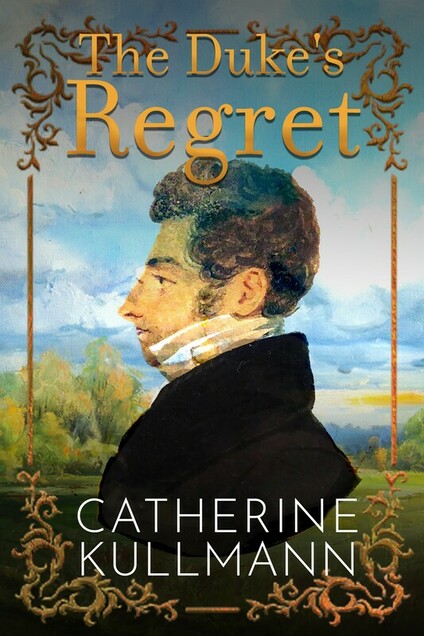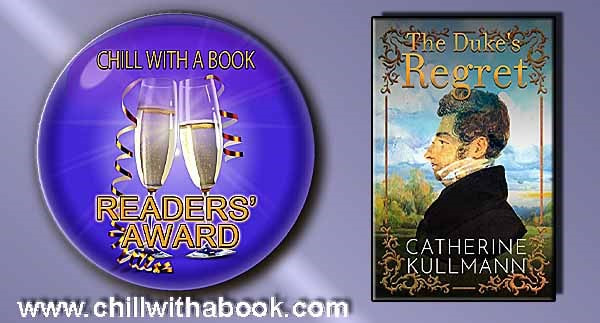Book 3 of The Duchess of Gracechurch Trilogy: The Duke's Regret
 Buy The Duke's Regret on Amazon
Buy The Duke's Regret on Amazon
A Duke can demand anything—except his wife’s love.
A chance meeting with a bereaved father makes Jeffrey, Duke of Gracechurch realise how hollow his own marriage and family life are. Persuaded to marry at a young age, he and his Duchess, Flora, live largely separate lives. Now he is determined to make amends to his wife and children and forge new relationships with them.
Flora does not know how to respond to her husband’s avowed change of heart. Her thoughts already turn to the future, when the children will have gone their own ways. Divorce would be out of the question, she knows, as she would be ruined socially, but a separation might be possible and even a discreet liaison once pregnancy is no longer a risk.
Can Jeffrey break down the barriers between them and convince his wife of his sincerity? Flora must decide if she will hazard her heart and her hard won peace of mind for a prize of undreamt of happiness.
What they say of Catherine Kullmann’s books: “So well-written and researched, but also thoroughly enjoyable” “Enjoyable Regency romance with an added touch of spice” "Deeply satisfying romance with a well-researched historical setting"
The Duke’s Regret is Book Three of The Duchess of Gracechurch Trilogy and contains spoilers for Book 1 The Murmur of Masks and Book 2 Perception & Illusion.
Read an extract from The Duke's Regret
London, March 1816
“Bastard! Ignorant poltroon! Oh! Beg your pardon, Gracechurch. Not you! Didn’t see you there.”
“Good God, Malvin! What has you in such a state?” The Duke of Gracechurch automatically steadied the grey-haired man who had almost knocked him down the steps of Whites. “Come back inside with me for a moment and sit down.”
Lord Malvin shook him off. Flecks of angry red stained his cheeks and he leaned heavily on his cane, struggling to catch his breath. “No. If I see that blackguard Rembleton again, I’ll throttle him.”
“Shall we go elsewhere?” Gracechurch suggested, worried that the older man was about to collapse at his feet. When there was no response, he hailed a passing hack and steered him towards it.
Malvin looked around, bemused. “What?”
Gracechurch urged him into the carriage. “You’ll take a glass at home with me.”
“What? Oh, yes. Much obliged. I apologise, Gracechurch. I’m not myself.”
“Take your time. You’ll soon feel more the thing.”
By the time they reached Gracechurch House Malvin was breathing more easily. He meekly handed over his hat and gloves and allowed himself to be divested of his greatcoat, before following his host to the library where he subsided into a chair beside the fire.
“Thank you,” he said, accepting a glass of brandy. “I should not have let Rembleton upset me so.”
“He’s a cantankerous buffoon who gives utterance to the first thought that comes into his head. It’s best to ignore him but not always easy.” Gracechurch was joint guardian of Lord Rembleton’s heir presumptive, the son of his deceased younger brother, and had first-hand experience of his lordship’s crassness.
Lord Malvin nodded. “He offered me his condolences on Arthur’s death—very proper, you will say—but had the gall to add I should not be too downhearted; after all I still had my heir and his two brothers, did I not? As if a son were no more than a convenience—an instrument to ensure the continuation of the family line—and nothing special in his own right.” His voice rose alarmingly and he fell silent, a hand pressed to his chest. “My poor boy,” he continued more quietly. “He was always merry as a lad and up to all sorts of mischief. And full of adventure—wouldn’t hear of Oxford—couldn’t wait to have his pair of colours. Nothing but the army would do him! But after twelve years, five in the Peninsula, he’d had enough.”
He sighed and stared into the fire. “He was sent home to recuperate in ’13. He’d been badly wounded at Vittoria and then contracted a debilitating fever. We got to know the man then, face to face and not just through his letters. He was a son to be proud of. He might have sold out in honour after Boney abdicated but he was determined to return to his regiment, even though he retained a limp. He’d only leave when he was sure the peace held, he said. But it did not last—not even for a year. And then came Waterloo.”
He sighed again and drained his glass. His high colour had faded but his features still bore the dull heaviness of grief. “I must apologise for intruding on you, Duke. Thank you for your kindness.”
Gracechurch shook his head. “Neither apologies nor thanks are necessary. There is very little to be said in the face of such a loss, but you were fortunate to have had such a son and he to have had such a father.”
“Thank you, Gracechurch.”
“Another glass?” The duke lifted the decanter invitingly.
“No, I thank you. My lady will be expecting me.”
“Are you at Malvin House? I’ll walk so far with you.”
A chance meeting with a bereaved father makes Jeffrey, Duke of Gracechurch realise how hollow his own marriage and family life are. Persuaded to marry at a young age, he and his Duchess, Flora, live largely separate lives. Now he is determined to make amends to his wife and children and forge new relationships with them.
Flora does not know how to respond to her husband’s avowed change of heart. Her thoughts already turn to the future, when the children will have gone their own ways. Divorce would be out of the question, she knows, as she would be ruined socially, but a separation might be possible and even a discreet liaison once pregnancy is no longer a risk.
Can Jeffrey break down the barriers between them and convince his wife of his sincerity? Flora must decide if she will hazard her heart and her hard won peace of mind for a prize of undreamt of happiness.
What they say of Catherine Kullmann’s books: “So well-written and researched, but also thoroughly enjoyable” “Enjoyable Regency romance with an added touch of spice” "Deeply satisfying romance with a well-researched historical setting"
The Duke’s Regret is Book Three of The Duchess of Gracechurch Trilogy and contains spoilers for Book 1 The Murmur of Masks and Book 2 Perception & Illusion.
Read an extract from The Duke's Regret
London, March 1816
“Bastard! Ignorant poltroon! Oh! Beg your pardon, Gracechurch. Not you! Didn’t see you there.”
“Good God, Malvin! What has you in such a state?” The Duke of Gracechurch automatically steadied the grey-haired man who had almost knocked him down the steps of Whites. “Come back inside with me for a moment and sit down.”
Lord Malvin shook him off. Flecks of angry red stained his cheeks and he leaned heavily on his cane, struggling to catch his breath. “No. If I see that blackguard Rembleton again, I’ll throttle him.”
“Shall we go elsewhere?” Gracechurch suggested, worried that the older man was about to collapse at his feet. When there was no response, he hailed a passing hack and steered him towards it.
Malvin looked around, bemused. “What?”
Gracechurch urged him into the carriage. “You’ll take a glass at home with me.”
“What? Oh, yes. Much obliged. I apologise, Gracechurch. I’m not myself.”
“Take your time. You’ll soon feel more the thing.”
By the time they reached Gracechurch House Malvin was breathing more easily. He meekly handed over his hat and gloves and allowed himself to be divested of his greatcoat, before following his host to the library where he subsided into a chair beside the fire.
“Thank you,” he said, accepting a glass of brandy. “I should not have let Rembleton upset me so.”
“He’s a cantankerous buffoon who gives utterance to the first thought that comes into his head. It’s best to ignore him but not always easy.” Gracechurch was joint guardian of Lord Rembleton’s heir presumptive, the son of his deceased younger brother, and had first-hand experience of his lordship’s crassness.
Lord Malvin nodded. “He offered me his condolences on Arthur’s death—very proper, you will say—but had the gall to add I should not be too downhearted; after all I still had my heir and his two brothers, did I not? As if a son were no more than a convenience—an instrument to ensure the continuation of the family line—and nothing special in his own right.” His voice rose alarmingly and he fell silent, a hand pressed to his chest. “My poor boy,” he continued more quietly. “He was always merry as a lad and up to all sorts of mischief. And full of adventure—wouldn’t hear of Oxford—couldn’t wait to have his pair of colours. Nothing but the army would do him! But after twelve years, five in the Peninsula, he’d had enough.”
He sighed and stared into the fire. “He was sent home to recuperate in ’13. He’d been badly wounded at Vittoria and then contracted a debilitating fever. We got to know the man then, face to face and not just through his letters. He was a son to be proud of. He might have sold out in honour after Boney abdicated but he was determined to return to his regiment, even though he retained a limp. He’d only leave when he was sure the peace held, he said. But it did not last—not even for a year. And then came Waterloo.”
He sighed again and drained his glass. His high colour had faded but his features still bore the dull heaviness of grief. “I must apologise for intruding on you, Duke. Thank you for your kindness.”
Gracechurch shook his head. “Neither apologies nor thanks are necessary. There is very little to be said in the face of such a loss, but you were fortunate to have had such a son and he to have had such a father.”
“Thank you, Gracechurch.”
“Another glass?” The duke lifted the decanter invitingly.
“No, I thank you. My lady will be expecting me.”
“Are you at Malvin House? I’ll walk so far with you.”

